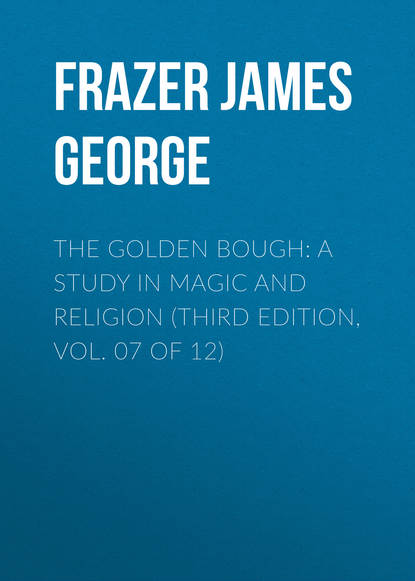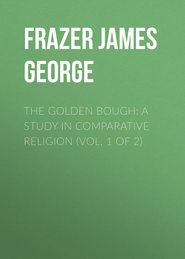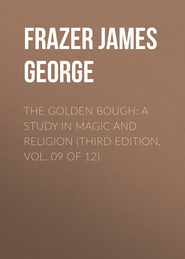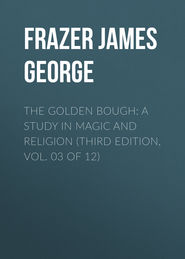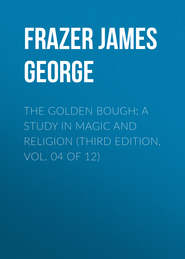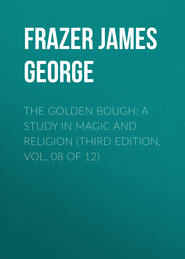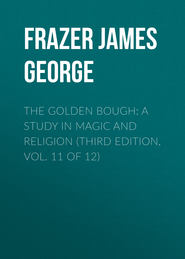По всем вопросам обращайтесь на: info@litportal.ru
(©) 2003-2024.
✖
The Golden Bough: A Study in Magic and Religion (Third Edition, Vol. 07 of 12)
Настройки чтения
Размер шрифта
Высота строк
Поля
157
See the references to the works of Overbeck and Farnell above. For example, a fine statue at Copenhagen, in the style of the age of Phidias, represents Demeter holding poppies and ears of corn in her left hand. See Farnell, op. cit. iii. 268, with plate xxviii.
158
Cornutus, Theologiae Graecae Compendium, 28, p. 56 ed. C. Lang.
159
Percy Gardner, Types of Greek Coins (Cambridge, 1883), p. 174, with plate x. No. 25.
160
Diodorus Siculus, v. 68. 1.
161
Hesiod, Works and Days, 448-474; Epictetus, Dissertationes, iii. 21. 12. For the autumnal migration and clangour of the cranes as the signal for sowing, see Aristophanes, Birds, 711; compare Theognis, 1197 sqq. But the Greeks also ploughed in spring (Hesiod, op. cit. 462; Xenophon, Oeconom. 16); indeed they ploughed thrice in the year (Theophrastus, Historia Plantarum, vii. 13. 6). At the approach of autumn the cranes of northern Europe collect about rivers and lakes, and after much trumpeting set out in enormous bands on their southward journey to the tropical regions of Africa and India. In early spring they return northward, and their flocks may be descried passing at a marvellous height overhead or halting to rest in the meadows beside some broad river. The bird emits its trumpet-like note both on the ground and on the wing. See Alfred Newton, Dictionary of Birds (London, 1893-1896), pp. 110 sq.
162
Hesiod, Works and Days, 383 sq., 615-617; Aratus, Phaenomena, 254-267; L. Ideler, Handbuch der mathematischen und technischen Chronologie (Berlin, 1825-1826), i. 241 sq. According to Pliny (Nat. Hist. xviii. 49) wheat, barley, and all other cereals were sown in Greece and Asia from the time of the autumn setting of the Pleiades. This date for ploughing and sowing is confirmed by Hippocrates and other medical writers. See W. Smith's Dictionary of Greek and Roman Antiquities,
i. 234. Latin writers prescribe the same date for the sowing of wheat. See Virgil, Georg. i. 219-226; Columella, De re rustica, ii. 8; Pliny, Nat. Hist. xviii. 223-226. In Columella's time the Pleiades, he tells us (l. c.), set in the morning of October 24th of the Julian calendar, which would correspond to the October 16th of our reckoning.
163
Plutarch, Isis et Osiris, 69.
164
Plutarch, Isis et Osiris, 70. Similarly Cornutus says that “Hades is fabled to have carried off Demeter's daughter because the seed vanishes for a time under the earth,” and he mentions that a festival of Demeter was celebrated at the time of sowing (Theologiae Graecae Compendium, 28, pp. 54, 55 ed. C. Lang). In a fragment of a Greek calendar which is preserved in the Louvre “the ascent (ἀναβάσις) of the goddess” is dated the seventh day of the month Dius, and “the descent or setting (δύσις) of the goddess” is dated the fourth day of the month Hephaestius, a month which seems to be otherwise unknown. See W. Froehner, Musée Nationale du Louvre, Les Inscriptions Grecques (Paris, 1880), pp. 50 sq. Greek inscriptions found at Mantinea refer to a worship of Demeter and Persephone, who are known to have had a sanctuary there (Pausanias, viii. 9. 2). The people of Mantinea celebrated “mysteries of the goddess” and a festival called the koragia, which seems to have represented the return of Persephone from the lower world. See W. Immerwahr, Die Kulte und Mythen Arkadiens (Leipsic, 1891), pp. 100 sq.; S. Reinach, Traité d'Epigraphie Grecque (Paris, 1885), pp. 141 sqq.; Hesychius, s. v. κοράγειν.
165
Theocritus, Idyl. vii.
166
In ancient Greece the vintage seems to have fallen somewhat earlier; for Hesiod bids the husbandman gather the ripe clusters at the time when Arcturus is a morning star, which in the poet's age was on the 18th of September. See Hesiod, Works and Days, 609 sqq.; L. Ideler, Handbuch der mathematischen und technischen Chronologie, i. 247.
167
See Adonis, Attis, Osiris, Second Edition, p. 190 note 2.
168
See Adonis, Attis, Osiris, Second Edition, p. 190 note 2.
169
Hesiod, Works and Days, 383 sq.
170
L. Ideler, Handbuch der mathematischen und technischen Chronologie, i. 242.
171
Compare Xenophon, Oeconomicus, 17, ἐπειδὰν γὰρ ὁ μετοπωρινὸς χρόνος ἔλθῃ, πάντες που οἱ ἄνθρωποι πρὸς τὸν θέον ἀποβλέπουσιν, ὅποτε βρέξας τὴν γῆν ἀφήσει αὐτοὺς σπείρειν.
172
August Mommsen, Feste der Stadt Athen im Altertum, p. 193.
173
See above, pp. 44 (#x_8_i17)sqq.
174
See Adonis, Attis, Osiris, Second Edition, pp. 283 sqq.
175
Scholiast on Aristophanes, Knights, 720; Suidas, s. vv. εἰρεσιώνη and προηροσίαι; Etymologicum Magnum, Hesychius, and Photius, Lexicon, s. v. προηρόσια; Plutarch, Septem Sapientum Convivium, 15; Dittenberger, Sylloge Inscriptionum Graecarum,
No. 521, line 29, and No. 628; Aug. Mommsen, Feste der Stadt Athen im Altertum (Leipsic, 1898), pp. 192 sqq. The inscriptions prove that the Proerosia was held at Eleusis and that it was distinct from the Great Mysteries, being mentioned separately from them. Some of the ancients accounted for the origin of the festival by a universal plague instead of a universal famine. But this version of the story no doubt arose from the common confusion between the similar Greek words for plague and famine (λοιμός and λιμός). That in the original version famine and not plague must have been alleged as the reason for instituting the Proerosia, appears plainly from the reference of the name to ploughing, from the dedication of the festival to Demeter, and from the offerings of first-fruits; for these circumstances, though quite appropriate to ceremonies designed to stay or avert dearth and famine, would be quite inappropriate in the case of a plague.
176
Hesychius, s. v. προηρόσια.
177
August Mommsen, Feste der Stadt Athen im Altertum, p. 194.
178
August Mommsen, l. c.
179
Dittenberger, Sylloge Inscriptionum Graecarum,
No. 521, lines 29 sqq.
180





